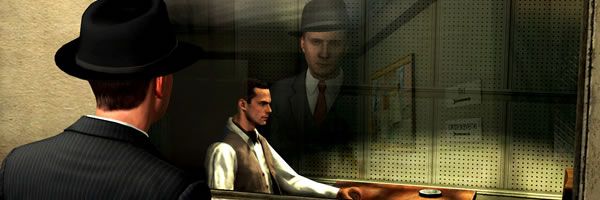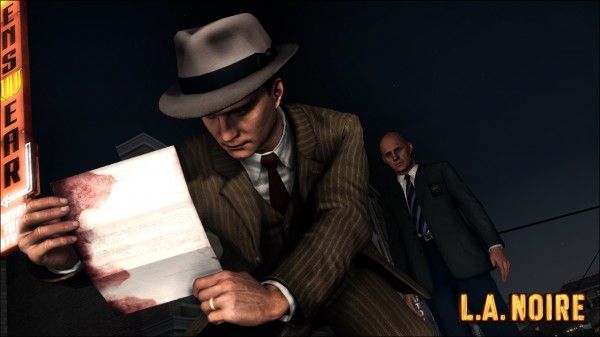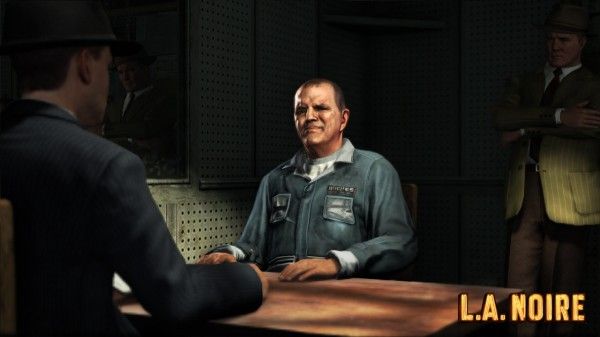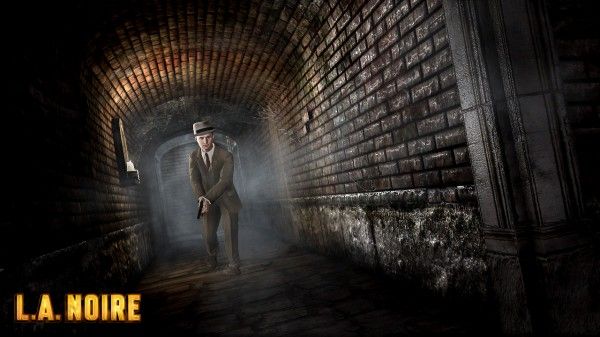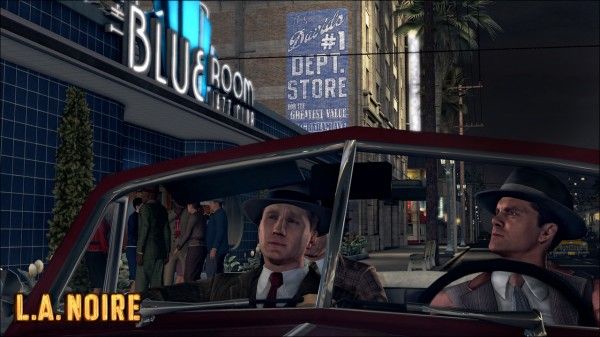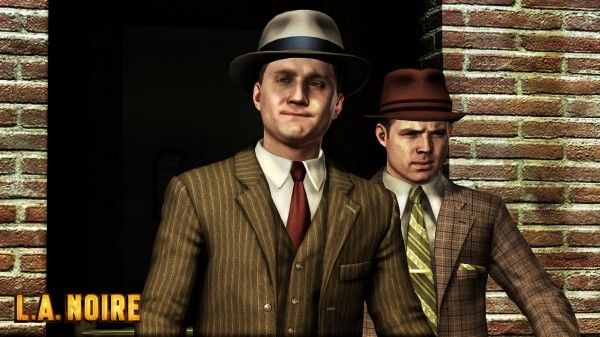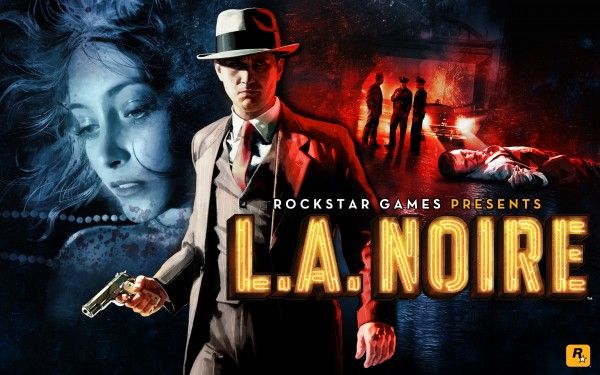I love the noir genre. It's probably my favorite just ahead of westerns. I love the stark cinematography, the world-weary cynicism and lost causes of the protagonists, and the pulpy accessibility of the stories with the thoughtful subtext simmering underneath. While we're bound to get one or two westerns a year, film noir—at least in its classic sense—seems to have disappeared. I've always been puzzled by its absence because great noir doesn't just transport us to another time, but another world. Rockstar and Team Bondi's L.A. Noire not only gives a modern audience a return to the genre, but actually sets them inside the world and lets them traverse a stunning recreation of 1940s Los Angeles. However, while the aesthetic and the individual crimes scream "noir", your rigid protagonist Cole Phelps lacks complexity, and the game leaves you wondering why another character wasn't the lead instead. The game also employs a questionable interrogation mode, which tries to make use of groundbreaking facial capture technology, but remains stuck in roundabout logic and a little too much guesswork. But no game is going to let you live noir like L.A. Noire and it's a case worth working.
There are some overarching storylines throughout L.A. Noire, but the majority of the game is broken down into individual cases. You'll play as detective Cole Phelps (Aaron Staton), a beat cop and former war hero who moving through the ranks of the LAPD. You'll work Traffic, Homicide, Vice, and Arson, but almost every case follows the same pattern: investigate and interrogate. Your superior will assign you and your partner a case, you'll go to the crime scene, search for clues, and interrogate witnesses and potential suspects. When you finish the case, you'll be given a ranking on your performance based on how many clues you found, how much truth you got out of the people you interrogated, and how much damage you caused in your investigation.
It's in the interrogation that L.A. Noire makes its greatest contribution to gaming. Team Bondi used new facial capture technology which is essential for reading the expressions of the person you're interviewing. Judging by the expressions and the clues at hand, you have three options after you hear an answer to your question: "Truth", "Doubt", and "Lie". If they're looking straight ahead and have nothing to hide, you should select "Truth". If you think they're lying but don't have the evidence to prove it, choose "Doubt". And if you know they're fibbing and have the evidence to catch them in a lie, select "Lie" and then you'll have to present evidence that proves they're lying.
As great as the facial expressions are, you still have to play to the story's logic. You can use intuition points (which are rare so you'll have to use them wisely) to remove one of the options, but when you're left with the choice between "Doubt" and "Lie", you're in trouble. The game's closest cousin in this regard is the Phoenix Wright series. You know someone is lying but when it comes to presenting evidence to prove that lie, the game thinks another piece of evidence is better.
The problem is made worse because the game doesn't always play fair. In one of the early cases, you'll be talking to a teenage girl who has been the victim of sexual molestation by a movie producer. When you ask her a question about the abuse, she'll look away, which usually means someone is lying. You'll select "Lie", and then in your notebook, you'll pick the clue "Evidence of Abuse". But that's incorrect. The right answer is "Truth", and you would never guess that in a million years. When the game plays this way, it reduces what should be a sharp detective story into a guessing game.
Thankfully, the game doesn't always go like this, and while investigation and interrogation provide the meat of the game, the narrative is spiced up with side-missions (street crimes that usually end with you killing the bad guys), shootouts, and chases by foot and by car. But while L.A. Noire may have the design of a Rockstar sandbox game, it's fairly linear. You can't draw your gun unless the situation calls for it and you can't change the overall story of the game, although you can change the direction of the stories by failing to chase down leads or accusing the wrong suspect.
Ironically, Team Bondi's greatest goal seems to be letting you walk the streets of their digital 1940s Los Angeles. They've done an incredible job of recreating the city, but you won't really start wandering until you're in free play mode. If you just start driving around during a case, you're likely to get into wrecks, and those damages count against your final ranking. In the end, it's best to just let your partner drive and warp to your next location.
But my biggest problem with L.A. Noire doesn't lie with the gameplay. The interrogation can be frustrating as hell, but when you're chasing down a suspect or digging through the city's dark underworld (which is even populated by real-life criminals like Mickey Cohen), the game shines. All of the mechanics are sound. There's room for the interrogation process to be tweaked, the investigation could use some more puzzles, and the world could be a little more open-ended. The presentation is superb. In addition to the glory of the re-created 1940s LA, the game boasts a cadre of familiar faces (it seems like half the cast of Mad Men is in this game) and the facial capture technology allows characters to come alive in a way never seen before in gaming. The sound design is also terrific. The music ranges from tunes of the period with a strong score to boot.
Where L.A. Noire truly fails is in its dull protagonist. A good noir detective is world-weary, cynical, smart, and had his own code where the darkness of the world hasn't driven him to corruption and his foolish desire to provide some semblance of nobility usually takes a personal toll. The game, despite its 1940s setting, actually owes more to 1970s noir like Chinatown and Team Bondi pulled no punches in showing the pervasive racism and sexism of the era. Again, the atmosphere is the game's greatest asset and Cole Phelps is surrounded by shady, complex characters at every turn.
But he's not among them. For about two-thirds of the game, there is nothing interesting about Phelps. The game has flashbacks to his days fighting in the Pacific and eventually you uncover his dark secret (but not through any investigating and it would have been cool if you actually got to play through these scenes rather passively view them via cut scenes), but it's a predictable reveal and ultimately you won't care because Phelps is so bland. And what's frustrating is that there's room of an honest noir protagonist working in the framework of a procedural. Jules Dassin's The Naked City (which was adapted into a DLC case and is a fun ride if you've seen the movie) has Barry Fitzgerald playing an honest cop, but he adds flair and vigor to the role. By contrast, Cole is a straight arrow who doesn't seem driven by righteousness as much as he has rigid desire to advance his career. That's partially a result of the game design because it wouldn't make much sense for Cole to progress if he was breaking all the rules to follow his own code. But Cole's old war buddy Jack Kelso (Bren Foster) lives at the margins of the story and by the end of the game you'll be left wondering why you couldn't have him be the protagonist instead of Phelps.
I love film noir and that's how L.A. Noire won me over. Team Bondi did a masterful job of creating the noir vibe and even blending styles from two different eras. I previously mentioned that L.A. Noire reminded me of the Phoenix Wright games. It also reminds me of was 2005's Gun. Gun skillfully adapted the western genre, gave players a bit of a sandbox, and ultimately provided solid foundations for a better video game. We never got Gun 2, but its aspirations were eventually realized in last year's superb Red Dead Redemption. Like Gun, L.A. Noire feels like a terrific starting point. The sequel could stick to LA or it could head over to New York. And wherever the game goes, Team Bondi is sure to get the setting right. Where it needs to improve is the design of its interrogation system, giving the player more leeway to free-roam and get into a little trouble, and providing players with a true noir protagonist instead of a brazen careerist who doesn't becomes interesting until the end of the game.
Rating: B-

